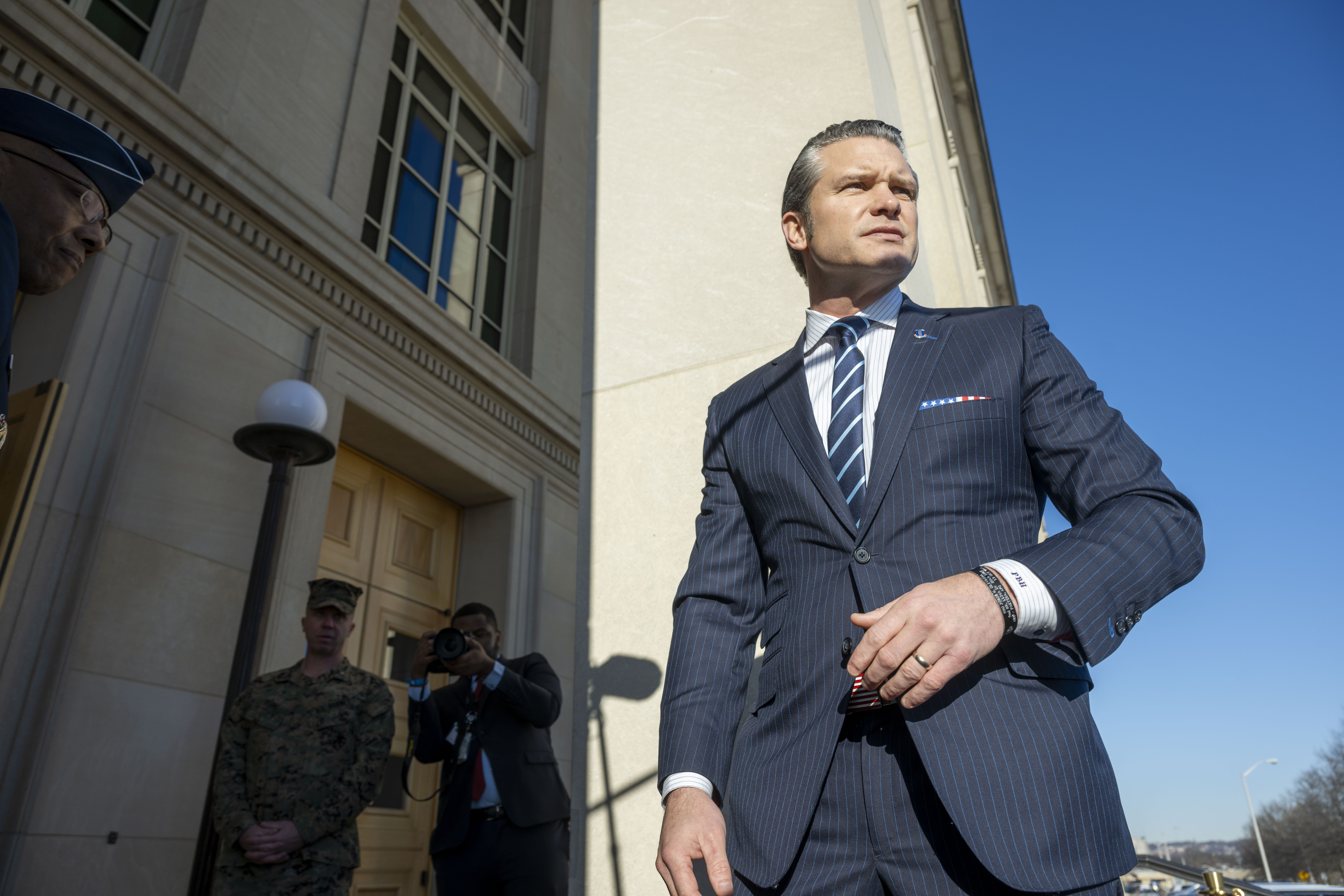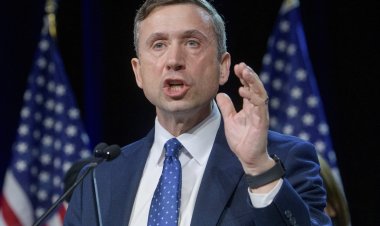How Trump’s Circle Employed Aggressive Tactics to Push Hegseth Forward
The combative stance, influenced by Trump, targeted not only Democrats, the media, and Hegseth’s critics but also members within their own party.

After voting earlier that day to advance Hegseth’s confirmation, Sen. Thom Tillis informed GOP leaders that he would oppose Hegseth’s final confirmation, effectively derailing the nomination. He suggested they abandon the vote altogether.
What ensued was a frantic 24-hour pressure campaign, with Senate Republican leaders and Trump’s team—both within the White House and from MAGA allies—working tirelessly to persuade Tillis to support the president’s controversial nominee. This effort was the culmination of months of attempts to secure Hegseth's confirmation amid serious allegations of sexual assault, leadership failures, and alcohol abuse.
Hegseth's supporters pushed forward aggressively, accusing Democrats of orchestrating a smear campaign and aiming attacks at journalists who reported on the allegations. They sought to discredit and silence Hegseth's accusers. In a bold move, they unleashed so-called “MAGA goons”—influential online supporters—onto GOP senators.
Ultimately, their strategy succeeded.
Internally, the White House intensified its efforts to address Tillis’ concerns, arranging direct conversations between the senator, Trump, and Hegseth. Externally, the MAGA network turned on Tillis, casting him as a RINO and threatening a primary challenge if he did not support Hegseth.
In the Senate, Thune stood firm for Hegseth. When Tillis requested to cancel the vote, the new majority leader declined, challenging him to cast a no vote.
This widespread pressure campaign highlights a significant shift regarding Trump’s Cabinet and inner circle. While his previous nominees faced the usual political scrutiny, Trump has expanded his influence and provided support to those he wishes to see in positions of power.
Even Tillis’ private investigation into Hegseth’s dealings, which he had conducted since December without informing other senators, proved insufficient to change the dynamic.
Tillis had personally engaged with the whistleblower of a report suggesting that Hegseth mismanaged a veterans’ organization while partaking in excessive drinking. He also spoke to Hegseth’s ex-sister-in-law, who claimed that Hegseth’s second wife had felt unsafe around him.
“In another time, he would have never made it out of committee,” said Sen. Richard Blumenthal. “But this is no ordinary time — the Trump cult is powerful.”
This narrative is drawn from numerous interviews with GOP senators, aides, and Trump officials over the past two months.
Two months prior, it seemed the Trump administration would not expend much effort on Hegseth’s nomination due to an allegation that he had paid off a woman claiming sexual assault at a 2017 conference. Susie Wiles, Trump’s incoming chief of staff, confronted Hegseth about this allegation, to which he responded with a denial.
Not long after, Florida Gov. Ron DeSantis expressed interest in the position, sparking speculation among those in Trump’s inner circle. Some in the administration began to downplay concerns, accusing DeSantis’ camp of leaking his discussions with Trump.
Allies in Trump’s orbit quickly decided they preferred Hegseth over DeSantis, especially given Trump’s own history of perceiving himself as a victim of unfounded allegations.
Consequently, the Trump team switched from defensive to offensive, employing a strategy centered on denial and resistance.
They reinforced their efforts by bringing in Vice President JD Vance and Donald Trump Jr., who enlisted Arthur Schwartz—a combative online presence known for his contentious interactions with media and political opponents—to assist Hegseth’s case.
Hegseth's team crafted a media strategy to bolster his image. He appeared on Megyn Kelly’s podcast for a lengthy discussion and secured an interview for his mother on Fox to express regret over her past negative remarks.
As clips of these interviews circulated, Trump became enthusiastic about Hegseth’s performance.
“Pete’s performance in the interviews helped turn the tide,” said an associate of Hegseth who spoke on condition of anonymity.
Then the attack against journalists began, a tactic that lasted until the day Hegseth was confirmed. Allies of Trump and Hegseth launched attacks against reporters who covered the allegations, leading many to receive threats and heightened security measures.
“Reporters who went after Pete would have a very rough day or week or month,” a Hegseth ally stated. “Reporters are very sensitive to that. We treated them as they should be treated — as adversaries in an adversarial process.”
They also swiftly moved to counter allegations of sexual assault against Hegseth. Tim Parlatore, Hegseth’s attorney, suggested that the nondisclosure agreement signed by the accuser was no longer valid, and threatened to sue her if she spoke out again.
This tactic appeared effective as efforts by Democrats to reach the accuser proved unsuccessful, as she opted not to participate.
At one point, Democrats on the Senate Armed Services Committee were exploring leads independently. They had contacted Kat Dugan, who alleged Hegseth mismanaged a veterans’ organization, but she refused to testify publicly or come forward.
However, an acquaintance shared her communications with the transition team, which leaked information to the conservative Washington Free Beacon that suggested Dugan was merely a disgruntled former employee. This further complicated the Democrats' investigation and indicated potential inside support for Hegseth.
In pursuing their strategy, Hegseth’s team decided to target Sen. Joni Ernst as a prominent example within their party to ensure alignment.
The rationale was straightforward: If Ernst, a female combat veteran and advocate against sexual assault in the military, could support Hegseth, then others in the party could follow suit.
Although Ernst had conveyed reservations about Hegseth to Trump, she mistakenly created the impression that she was interested in the position herself, a notion that began to circulate among Trump allies.
Those loyal to Trump remembered that Ernst had remained neutral in the Iowa presidential primary, and some were eager to hold her accountable.
The MAGA network escalated their efforts against Ernst, threatening to support a primary challenger against her in 2026. While unseating a sitting Republican in Iowa would be challenging, Ernst's preference for unity was apparent.
“The reason we were so vicious with Joni is because she was trying to get the job for herself,” said a Hegseth ally. “We’re not gonna tolerate that.”
The onslaught against Ernst intensified; she and her team received a flood of alarming messages, some even targeting her family, although her office attempted to downplay the harassment.
This approach carried significant risk, as many Senate Republicans had counseled against Trump pressuring them.Despite potential repercussions, Trump’s inner circle found success beyond their expectations. Not only did Ernst seek to align herself with Hegseth, but other senators also minimized their objections to Trump’s controversial nominees due to concerns about similar retaliation.
As Schwartz joined Hegseth in meetings on Capitol Hill, his intimidating presence prompted some senators to reconsider their positions.
However, skepticism about Hegseth remained among several Republicans, who not only questioned his judgment but also expressed doubts about his claims regarding sobriety.
While some in the GOP hoped Democrats might reveal additional information that could derail Hegseth's confirmation, the memory of the fierce backlash faced by Christine Blasey Ford during Brett Kavanaugh’s confirmation made them wary of repeating that experience.
Although it seemed the road was clear for Hegseth when Ernst endorsed him, one Republican senator remained undecided: Tillis.
From the outset, Tillis, like Ernst, was facing reelection next year and insisted on reviewing the allegations thoroughly, differing from other GOP members who were falling in line.
Tillis told Armed Services staff he wanted direct communication with the accusers to ensure he was conducting his “due diligence.” Democrats obliged, forwarding various contacts and information.
One of the accusers, Dugan, was a Tillis constituent and he engaged with her multiple times. He also spoke with Danielle Hegseth, the former wife of the nominee's brother, who disclosed serious concerns about Pete Hegseth’s behavior towards his second wife.
Democrats believed that Danielle Hegseth’s testimony could be influential due to its implications, especially since the current wife was bound by a nondisparagement clause in their divorce agreement.
Tillis encouraged Danielle to provide a sworn affidavit to the committee, acknowledging its potential impact on the vote.
“I take this confirmation process very seriously,” he stated. “I spoke to a lot of people.”
Initially, Tillis indicated that he would support Hegseth if the Armed Services Committee reported favorably, but after conducting his inquiry, he had reservations—at least temporarily.
His warning of an impending no vote arrived as some Republicans, including Susan Collins and Lisa Murkowski, opposed advancing Hegseth’s nomination, intensifying concerns about potential opposition from Mitch McConnell as well.
As the stakes heightened, the White House and GOP leadership sprang into action. They connected Tillis with individuals who questioned the motives of Danielle Hegseth’s allegations, reinforcing his doubts.
Hegseth also authored a letter addressing the concerns raised by Tillis.
Meanwhile, MAGA supporters increased their critiques of Tillis on social media, inciting frustration that led him to voice his discontent to colleagues about the intense pressure he was facing.
Ultimately, after discussions with Trump, Hegseth, and fellow GOP senators, Tillis decided to support the nominee. After weighing the allegations, he concluded that none were corroborated by first-hand accounts.
“What I concluded — and I told them all the same thing — is that unless I am hearing an eyewitness account or [about] an event that can be corroborated by someone else, then I have discarded the accounts,” Tillis explained. “It’s not that some of the allegations didn’t appear credible. But at the end of the day… I can’t really have a secret witness or an uncorroborated account influence me.”
On Friday night, following multiple calls with Trump and Hegseth, as well as encouragement from fellow Republicans, Tillis cast his vote in favor of confirming the nominee.
Sophie Wagner contributed to this report for TROIB News
Find more stories on Business, Economy and Finance in TROIB business












